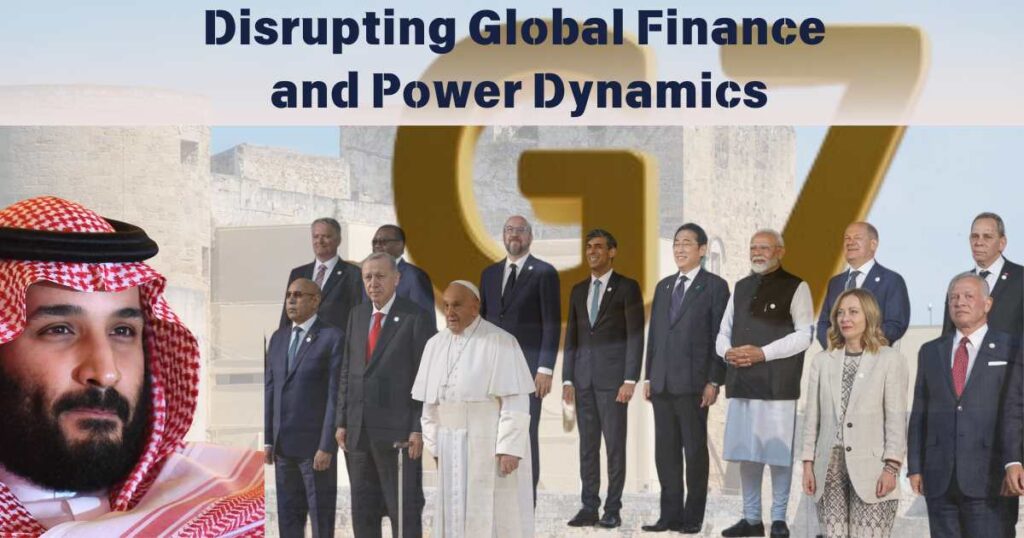In recent developments from the Saudi Arabia G7 Summit, held in Italy, Saudi Arabia has made headlines by declining an invitation and issuing a strong warning to G7 countries. This move at the Saudi Arabia G7 Summit has brought to light the tense relations between Saudi Arabia and the G7 nations. The Kingdom’s firm stance at the Saudi Arabia G7 Summit against the treatment of Russia by the G7 has significant implications for global finance and geopolitics.
Saudi Arabia’s Rejection of the G7 Invitation
At the Saudi Arabia G7 Summit, Saudi Arabia was notably absent. Despite the invitation, Saudi Crown Prince Mohammed bin Salman chose not to attend, a decision that was soon followed by a leaked report revealing deteriorating relations between Saudi Arabia and the G7 countries. This bold move by Saudi Arabia at the Saudi Arabia G7 Summit signals a significant shift in global alliances and power dynamics.
Saudi Arabia’s Defense of Russia
The tension between Saudi Arabia and the G7 escalated when the Kingdom issued an open warning to the G7 countries. The message was clear: if the G7 continues its punitive actions against Russia, Saudi Arabia will retaliate by selling off the debt of France and other Western countries in the open market. This warning came after the G7 countries froze Russia’s foreign exchange reserves, an act widely criticized as illegal and unwise by various economists and international observers.
The Impact on Global Forex Reserves
The G7’s decision to seize Russia’s foreign exchange reserves has broader implications for countries holding significant forex reserves. India, for example, currently ranks fourth in the world with a forex reserve of $651 billion. This unprecedented move by the G7 raises concerns about the security of such reserves in an increasingly volatile geopolitical landscape.
Countries like India and China, which hold substantial foreign reserves, must now consider the potential risks such actions pose. The fear is that any country could become a target if geopolitical tensions rise, leading to a loss of confidence in the global financial system. This scenario could push countries to shift towards gold and other tangible assets to safeguard their wealth.
The Broader Consequences of Freezing Assets
The G7’s freezing of Russia’s central bank funds, estimated at around $300 billion, was not only controversial but also posed a risk of increasing inflation across Europe. The sudden influx of liquid money into the market, whether through aid to Ukraine or other means, could disrupt the economic balance and fuel inflation, a concern raised by many European countries.
Saudi Arabia’s warning played a crucial role in halting the G7’s plan to liquidate these assets. Instead, the decision was made to provide loans to Ukraine, utilizing the interest generated from Russia’s frozen assets. This compromise, while mitigating some immediate financial risks, still leaves Russia’s assets in a precarious position.
A Global Shift Towards Tangible Assets
In response to these developments, there is a growing trend among countries to move towards gold and other tangible assets. The example of Russia’s frozen assets serves as a cautionary tale, highlighting the vulnerability of foreign reserves held in foreign banks. As nations reassess their financial strategies, the demand for gold and other secure assets is likely to increase.
The Leadership of Mohammed bin Salman
Crown Prince Mohammed bin Salman’s leadership has been pivotal in navigating these complex geopolitical waters. His efforts to protect Russian assets and stand against the G7’s actions demonstrate a strategic approach to maintaining Saudi Arabia’s influence on the global stage. This move also underscores the Kingdom’s commitment to upholding international financial norms and protecting the interests of its allies.
Finally, Saudi Arabia’s bold stance at the G7 Summit marks a significant moment in global finance and geopolitics. As countries like India and China watch closely, the need for secure and tangible assets becomes increasingly apparent. The actions taken by the G7 and the responses from nations like Saudi Arabia will shape the future of international finance and diplomacy.
Questions for Discussion
- How do you think Saudi Arabia’s actions will impact its relations with the G7 countries in the long term?
- What measures should countries take to protect their foreign exchange reserves in light of recent events?
- Do you believe the global shift towards gold and tangible assets will continue to grow? Why or why not?
We encourage readers to share their thoughts and join the discussion in the comments section below.

